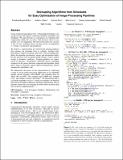Decoupling algorithms from schedules for easy optimization of image processing pipelines
Author(s)
Adams, Andrew; Paris, Sylvain; Levoy, Marc; Ragan-Kelley, Jonathan Millar; Amarasinghe, Saman P.; Durand, Fredo; ... Show more Show less
DownloadAmarasinghe_Decoupling algorithms.pdf (11.64Mb)
OPEN_ACCESS_POLICY
Open Access Policy
Creative Commons Attribution-Noncommercial-Share Alike
Terms of use
Metadata
Show full item recordAbstract
Using existing programming tools, writing high-performance image processing code requires sacrificing readability, portability, and modularity. We argue that this is a consequence of conflating what computations define the algorithm, with decisions about storage and the order of computation. We refer to these latter two concerns as the schedule, including choices of tiling, fusion, recomputation vs. storage, vectorization, and parallelism.
We propose a representation for feed-forward imaging pipelines that separates the algorithm from its schedule, enabling high-performance without sacrificing code clarity. This decoupling simplifies the algorithm specification: images and intermediate buffers become functions over an infinite integer domain, with no explicit storage or boundary conditions. Imaging pipelines are compositions of functions. Programmers separately specify scheduling strategies for the various functions composing the algorithm, which allows them to efficiently explore different optimizations without changing the algorithmic code.
We demonstrate the power of this representation by expressing a range of recent image processing applications in an embedded domain specific language called Halide, and compiling them for ARM, x86, and GPUs. Our compiler targets SIMD units, multiple cores, and complex memory hierarchies. We demonstrate that it can handle algorithms such as a camera raw pipeline, the bilateral grid, fast local Laplacian filtering, and image segmentation. The algorithms expressed in our language are both shorter and faster than state-of-the-art implementations.
Date issued
2012-07Department
Massachusetts Institute of Technology. Computer Science and Artificial Intelligence Laboratory; Massachusetts Institute of Technology. Department of Electrical Engineering and Computer ScienceJournal
ACM Transactions on Graphics
Publisher
Association for Computing Machinery (ACM)
Citation
Jonathan Ragan-Kelley, Andrew Adams, Sylvain Paris, Marc Levoy, Saman Amarasinghe, and Fredo Durand. 2012. Decoupling algorithms from schedules for easy optimization of image processing pipelines. ACM Trans. Graph. 31, 4, Article 32 (July 2012), 12 pages.
Version: Author's final manuscript
ISSN
07300301